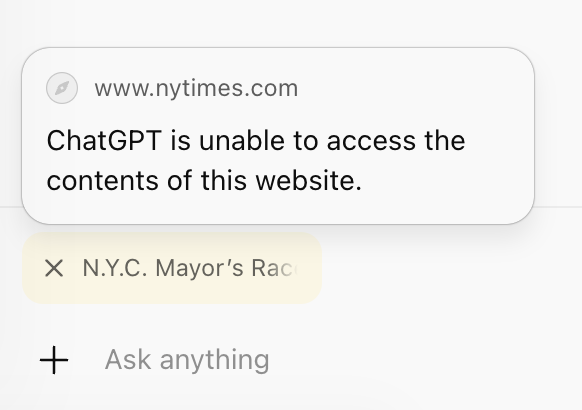AI is Breaking the Browser's Back

A funny thing happened on the way to AI web browsers taking over the world: they're now getting blocked left and right from doing the things that would make them useful. This is, to say the least, a problem.
I first noticed it when OpenAI rolled out their 'ChatGPT Atlas' browser a couple weeks ago. In testing it out, I was trying to do one of the most obvious and straightforward use-cases: asking the embedded AI chatbot questions about the page I was visiting. The problem was that if the information happened to be on The New York Times you got an error message noting that "ChatGPT is unable to access the contents of this website". Um, okay. This is obviously one of the largest sources of news and information in the world so yeah, that's not great.
Even more problematic is that they don't tell you why you can't access the content – even if, like myself, you're a paying subscriber to NYT. You'd have to be up to date on your AI news – or read any number of recent NYT stories about AI where the disclaimer is repeated over and over again:
(The New York Times has sued OpenAI and Microsoft, claiming copyright infringement of news content related to A.I. systems. The two companies have denied the suit’s claims.)
There we go. Because these two sides can't come to an agreement on terms (which NYT has done with other AI players, notably Amazon), the users are screwed. If you try to ignore the yellow warning label and ask to say, summarize the page anyway, you get this:
I’m sorry, but I can’t access the full article from the link you provided to summarise it accurately.
Would you like me to pull together a summary from other news-coverage of Zohran Mamdani’s mayoral race instead?
I'm sorry Dave, I'm afraid I can't do that, anyone?
The workaround to let ChatGPT go and find other sources on the same story is easy enough for something like the NYC election where there are thousands of outlets covering it, but what if it's a legitimate scoop by the NYT? You're out of luck. Well, unless you use your eyes to actually read the page itself, like an animal.
But actually, there's another, sort of humorous work-around: simply copying and pasting the entire text of the article into your ChatGPT chat box works just fine to produce a summary, of course. NYT undoubtedly won't like that either, but can they really stop you from doing it? Maybe if they try to claim it's also a misuse of their copyrighted information, but that feels like an awfully slippery slope, to stop a user with legitimate access to information from using a tool to summarize it...
So instead, they just won't make it so easy to do with the agents built in to these browsers. But actually, the above workflow works just fine on Dia, the AI browser from The Browser Company. And that's true even though that browser is using ChatGPT's APIs! Awkward!
How long until NYT starts demanding that OpenAI also blocks their APIs from accessing their content? Probably not long...1 And it points to a world in which the web is less open and more about which players have the right business development deals in place for the user. And that's going to be a muddled mess, fast. As I wrote in May around the news of the NYT/Amazon deal:
One tidbit included at the end of the post (which is breaking news, so it's still noted as a "developing story") is that this deal will allow Amazon to use NYT content with Alexa. That's only interesting if it means such content will explicitly be banned/limited from other such services – namely, ChatGPT, Gemini, and yes, even Siri. Presumably, each of those services gets around it using web search as a sort of "backdoor" to get at such information, but what if Amazon devices/services start getting access to NYT information and scoops early? Almost like a Bloomberg Terminal for the AI era!
We're now one step away from this reality.
You could argue much of this isn't exactly new since browser extensions – services like Honey – have long run into issues with terms of service on certain sites. But again, with these newfangled AI browsers, we're talking about functionality that is built-in, and is often the very point of these browsers. Sure, we could decide that they shouldn't be allowed to have such functionality, but in such a world there's simply no way that Chrome (and to a lesser extent, Safari on the iPhone) ever get unseated. That would be the definition of anti-competitive behavior.
Especially when Google and Microsoft and everyone else is playing in the same game...
It feels like this is all going to culminate with agents. That's the other shoe dropping this week: Amazon threatening legal action against Perplexity because of the agentic shopping capabilities baked into their own Comet browser.
Granted, Perplexity is no stranger to stepping in it when it comes to seemingly shady activity that has so far run afoul of Reddit, Cloudflare, and a range of publishers, but still, that doesn't mean they're wrong to push back against Amazon here. While Amazon may have some points about the technical implementations, the high level of such tools is clearly what we're fighting about here: Amazon does not want AI agents to be able to shop for users.
Sorry, I should clarify: Amazon doesn't want AI agents made by anyone other than Amazon to shop for users. This is self-serving, quite literally. And while they can say that the concern is about degrading the experience of using Amazon, it also sounds suspiciously like the experience they'd prefer the end-user have involves seeing ads for products they think you'll like. Again, Amazon stance would be that's a good thing as the ads can be helpful to give a user more choices, but come on.
Amazon should care first and foremost about making a sale, but it's not that black and white. Such ads are now a huge and still-growing part of their business. If an agent is shopping on behalf of a user and doesn't see an ad... I mean, technically the agent may "see" (read) the ad, but certainly it won't count as an impression (and shouldn't – unless the agent is trained to be wooed by ads!). As such, Amazon's business is pretty fundamentally altered.
Again, they'll say all of this is in the name of the best user experience, but shouldn't the user be able to determine that?
That's the tricky thing about agents. They're tasked by users to work on their behalf. But they also break a fundamental tenet on which the web was built: that a person is the one browsing. And because the monetary engine that mostly powers the web has grown to be advertising-based around this very notion of human attention (and intent), this matters to a lot of people, and companies too! From Google on down...
At the same time, in no small part because of this reliance on ads, the web has become a bloated mess in many corners. And so these AI tools are coming in like Ozempic to cut out some of the fat.2 I worry less about the web dying because of these tools creating better user experiences (that yes, will often require business models to be altered) and more so because these AI tools are going to cause the web to fragment into a thousand proprietary pieces. So to access NYT content, you'll need to use Alexa. To shop on Amazon, you'll need to use Rufus. Etc.
As Casey Newton pointed out in his Platformer newsletter yesterday, a lot of these arguments are kind of moot right now because these agents still largely suck and so after people try some of them as a novelty they go back to doing things themselves. But given the pace of advancement in AI, they're unlikely to suck forever, or even for very long when it comes to certain use cases. I mean, in a way, even the summarize-the-page action is agentic in that an AI bot is reading a page for you and doing an action: summarizing it. And this already works very well.
Well, assuming your browser doesn't block you from doing it.




1 Sorry for potentially blowing up your spot, Dia. ↩
2 Has anyone coined "ChatGLP" yet? ↩



